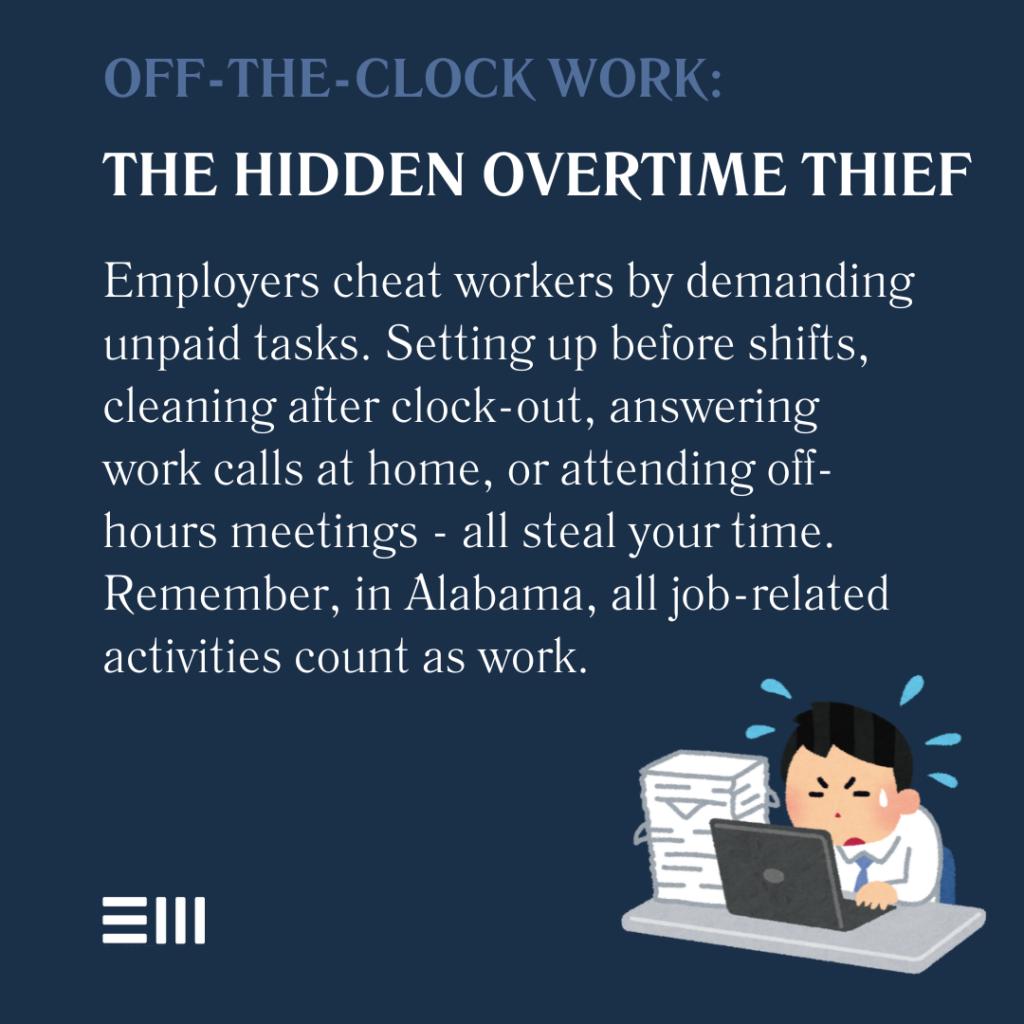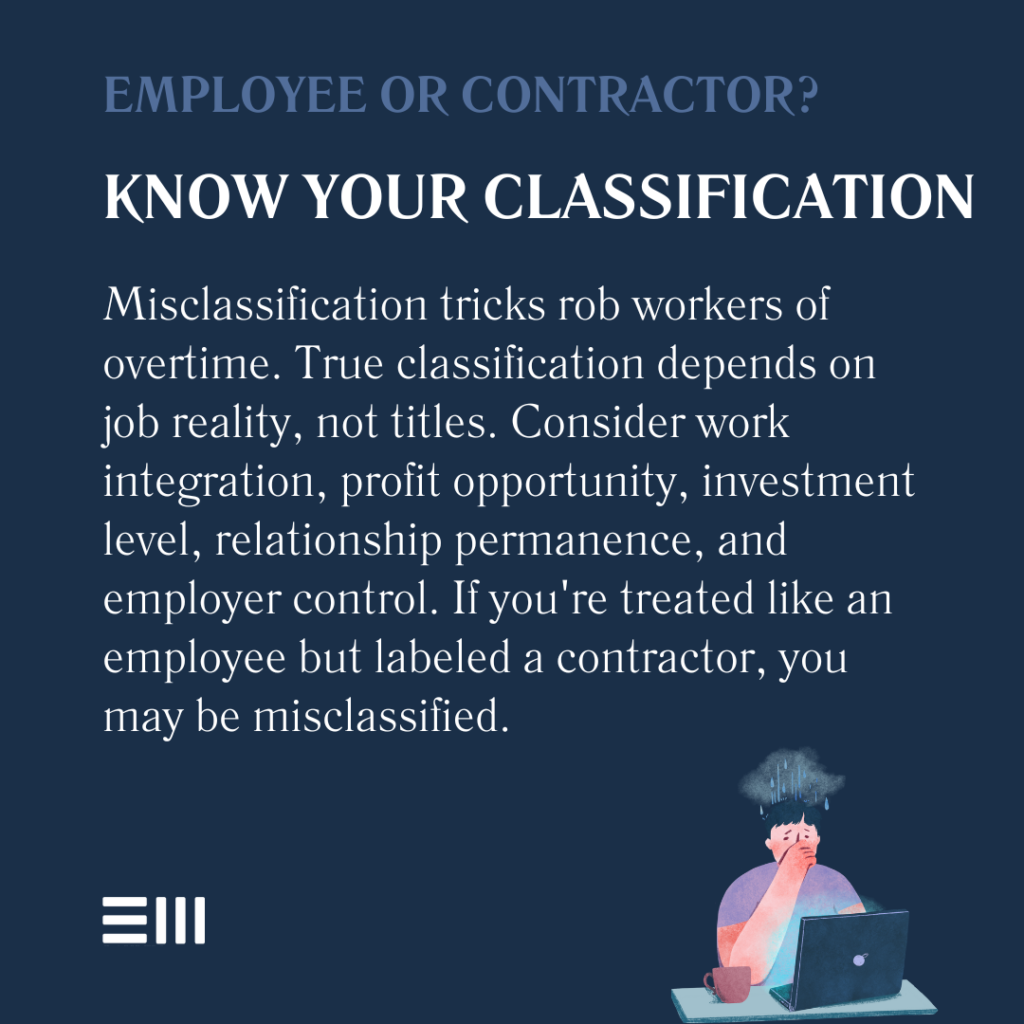
In 2023, the U.S. Department of Labor recovered over $274 million in back wages for more than 163,000 workers.
As an employee in Alabama, understanding the tactics some employers use to avoid paying overtime is crucial for protecting your rights and ensuring fair compensation.
Overtime pay is a fundamental right for many workers, designed to compensate them for long hours and promote a healthy work-life balance.
However, some employers resort to underhanded methods to avoid paying overtime, often leaving workers shortchanged and frustrated.
Misclassifying Employees as Exempt
One of the most prevalent tactics used by employers to avoid paying overtime is misclassifying employees as exempt from overtime requirements.
This trick involves labeling workers as “managers” or “administrators” when their actual job duties don’t meet the legal criteria for exemption.
In Alabama, as in other states, employees must meet specific salary and job duty requirements to be considered exempt.
For example, executive employees must earn at least $684 per week and have primary duties that involve managing the enterprise or a department, along with the authority to hire, fire, or influence the employment status of other employees.
Employers often exploit this classification by giving employees misleading job titles or minimal managerial responsibilities while still expecting them to perform non-exempt work.
It’s essential to understand that job titles alone don’t determine exempt status—the actual job duties and salary level are what matter.
Incorrectly Calculating Regular Rate of Pay
Another sneaky method some employers use is manipulating the calculation of an employee’s regular pay rate. The regular rate is crucial because it serves as the basis for calculating overtime pay.
In Alabama, as per federal law, non-exempt employees must receive at least 1.5 times their regular rate of pay for hours worked beyond 40 in a workweek. However, some employers try to lower this rate by excluding certain types of compensation from the calculation, such as non-discretionary bonuses or shift differentials.
For instance, if an employee earns a base rate of $15 per hour plus a $100 weekly production bonus, the employer must include that bonus in the regular rate calculation. Failing to do so results in a lower overtime rate and cheats the worker out of their full overtime pay.

Off-the-Clock Work
Requiring or allowing employees to work off-the-clock is a direct violation of labor laws. This tactic involves asking workers to perform job-related tasks before clocking in, after clocking out, or during unpaid meal breaks.
Examples of off-the-clock work include:
- Setting up workstations or preparing equipment before the shift starts;
- Cleaning up or closing procedures after clocking out;
- Answering work-related calls or emails from home; and
- Attending mandatory meetings or training sessions outside of regular work hours.
In Alabama, as in all states, employers must pay for all hours worked, including time spent on job-related activities outside of scheduled shifts. Encouraging or even tacitly allowing off-the-clock work is illegal and deprives workers of rightful overtime pay.
Averaging Hours Across Workweeks
Some employers attempt to avoid overtime by averaging hours worked across multiple workweeks. This practice is illegal under both federal and Alabama state law.
For example, if an employee works 50 hours in one week and 30 hours the next, the employer cannot average these hours to 40 per week to avoid paying overtime. Overtime must be calculated on a workweek basis, typically defined as any fixed and regularly recurring period of 168 hours or seven consecutive 24-hour periods.
Employers who use this tactic often claim they’re providing “comp time” or flexible scheduling, but non-exempt employees in the private sector are entitled to overtime pay for hours worked over 40 in each individual workweek.
Manipulating Time Records
Some unscrupulous employers may alter time records to reduce the number of hours recorded, effectively erasing evidence of overtime work. This can take various forms, such as:
- Rounding down clock-in and clock-out times;
- Deleting or modifying time entries; and
- Automatically deducting meal breaks even when employees work through them.
In Alabama, employers are required to maintain accurate time records for non-exempt employees. Manipulating these records is a serious violation of labor laws and can result in significant penalties for the employer.
Employees should keep their own records of hours worked and regularly compare them with their pay stubs to ensure accuracy. Any discrepancies should be reported immediately to the employer or the appropriate labor authorities.
Paying “Straight Time” for Overtime Hours
Some employers may pay employees their regular hourly rate for all hours worked, including those over 40 in a workweek. This practice, known as paying “straight time” for overtime, is illegal.
For example, if an employee works 50 hours in a week at a regular rate of $20 per hour, they should receive:
- $800 for the first 40 hours ($20 x 40);
- $300 for the 10 overtime hours ($30 x 10); and
- Total: $1,100.
An employer paying straight time would only pay $1,000 ($20 x 50), shortchanging the employee by $100.
In Alabama, as mandated by federal law, non-exempt employees must receive 1.5 times their regular rate for all hours worked over 40 in a workweek. Employers cannot avoid this requirement by agreement with the employee or by paying a higher regular rate.
Misuse of the Fluctuating Workweek Method
The fluctuating workweek method is a legal way to calculate overtime for salaried, non-exempt employees whose hours vary from week to week. However, some employers misuse this method to underpay workers.
Under this method, the employee receives a fixed salary for all hours worked, and overtime is paid at 0.5 times the regular rate for that week, rather than 1.5 times. The regular rate is calculated by dividing the weekly salary by the number of hours worked that week.
For example, if an employee with a $800 weekly salary works 50 hours:
- Regular rate: $800 / 50 = $16 per hour;
- Overtime rate: $16 x 0.5 = $8 per hour;
- Overtime pay: $8 x 10 = $80; and
- Total pay: $800 + $80 = $880.
While this method is legal when properly applied, some employers misuse it by:
- Applying it to hourly workers;
- Not paying the full salary in weeks with fewer hours; and
- Failing to clearly communicate the pay arrangement to employees.
In Alabama, employers must ensure they meet all requirements for using the fluctuating workweek method, including obtaining the employee’s clear understanding of the pay arrangement.

Improper Use of Tip Credits
In industries where tipping is common, such as restaurants and hospitality, some employers may misuse the tip credit provision to avoid paying proper overtime.
Under federal law, which Alabama follows, employers can take a tip credit towards their minimum wage obligation for tipped employees. However, this credit cannot exceed the difference between the required cash wage (which must be at least $2.13) and the federal minimum wage.
When it comes to overtime, the tip credit applies to the regular rate of pay, not the overtime rate. Some employers incorrectly apply the full tip credit to the overtime rate, resulting in underpayment.
For example, if a tipped employee works 45 hours in a week:
- Regular rate (including tips): $7.25 per hour;
- Overtime rate: $10.88 per hour (1.5 x $7.25);
- Cash wage for regular hours: $2.13 per hour; and
- Cash wage for overtime hours: $5.76 per hour ($10.88 – $5.12 tip credit).
Employers who apply the full $5.12 tip credit to overtime hours, paying only $5.76 for all hours, are violating overtime laws.
Misclassifying Employees as Independent Contractors
Another common tactic used by employers to avoid paying overtime is misclassifying employees as independent contractors. Independent contractors are not covered by the Fair Labor Standards Act (FLSA) and are not entitled to overtime pay.
However, the classification of a worker as an employee or independent contractor depends on the economic reality of the relationship, not on what the employer calls it. Factors considered include:
- The extent to which the work performed is an integral part of the employer’s business;
- The worker’s opportunity for profit or loss depending on their managerial skill;
- The extent of the relative investments of the employer and the worker;
- The permanency of the relationship; and
- The degree of control exercised or retained by the employer.
In Alabama, as in other states, misclassification of employees as independent contractors is a serious issue. Workers who believe they’ve been misclassified should seek legal advice or contact the Alabama Department of Labor for assistance.
Claiming “Salary” Covers All Hours Worked
Some employers may tell salaried employees that their salary covers all hours worked, regardless of how many hours they actually work. This is often not true and can result in unpaid overtime.
While some salaried employees may be exempt from overtime requirements, many are not. Non-exempt salaried employees are still entitled to overtime pay for hours worked over 40 in a workweek.
For non-exempt salaried employees, overtime should be calculated as follows:
- Calculate the regular hourly rate by dividing the weekly salary by 40; then
- Pay 1.5 times this rate for all hours over 40.
For example, if a non-exempt salaried employee earning $800 per week works 50 hours:
- Regular rate: $800 / 40 = $20 per hour;
- Overtime rate: $20 x 1.5 = $30 per hour;
- Overtime pay: $30 x 10 = $300; and
- Total pay: $800 + $300 = $1,100.
In Alabama, employers must understand that paying a salary does not automatically make an employee exempt from overtime requirements. The employee’s job duties and salary level must meet specific criteria for exemption.
Frequently Asked Questions
Navigating the complexities of overtime pay can be challenging, so we’ve compiled answers to the most pressing questions Alabama workers ask about their rights to fair compensation.
What Is Considered Overtime in Alabama?
In Alabama, overtime is defined as any hours worked beyond 40 in a single workweek for non-exempt employees.
The workweek is any fixed and regularly recurring period of 168 hours or seven consecutive 24-hour periods. It doesn’t necessarily have to coincide with the calendar week.
How Is Overtime Pay Calculated?
Overtime pay is calculated at a rate of not less than 1.5 times the employee’s regular rate of pay for all hours worked over 40 in a workweek.
The regular rate must include all non-discretionary compensation earned by the employee, such as non-discretionary bonuses, shift differentials, and commissions.
Can an Employee Waive Their Right to Overtime Pay?
No, an employee cannot waive their right to overtime pay. This right is protected by federal and state law, and any agreement between an employer and employee to waive overtime is not legally binding.
Even if an employee agrees to work overtime without extra pay, the employer is still obligated to pay the required overtime rate.
Can My Employer Give Me Comp Time Instead of Overtime Pay?
In the private sector, employers cannot provide compensatory time off (comp time) in lieu of overtime pay for non-exempt employees.
This practice is only allowed for public sector employees. Private employers must pay overtime wages for all hours worked over 40 in a workweek, regardless of any comp time arrangements.
Is It Legal for My Employer to Average My Hours Over Two Weeks to Avoid Paying Overtime?
No, this practice is not legal. Overtime must be calculated on a workweek basis. Each workweek stands alone, and an employer cannot average hours over two or more weeks to avoid paying overtime, even if the pay period is bi-weekly or monthly.
What Records Should I Keep to Protect My Right to Overtime Pay?
To protect your right to overtime pay, you should keep:
- A personal record of your daily start and end times;
- Notes on any work performed during meal breaks or outside regular hours;
- Copies of all pay stubs and time cards; and
- Any written communications with your employer about your work hours or pay.
These records can be crucial if you need to file a complaint or lawsuit to recover unpaid overtime wages.
Can My Employer Retaliate Against Me for Complaining About Unpaid Overtime?
No, it is illegal for an employer to retaliate against an employee for asserting their rights under wage and hour laws. This includes complaining about unpaid overtime, filing a wage claim, or participating in an investigation.
If you experience retaliation, you may have additional legal claims against your employer.
Get the Overtime Pay You Deserve
Have you fallen victim to these overtime cheating tricks? Don’t let your hard-earned wages slip away. At Baxley Maniscalco, we’re committed to fighting for the rights of Alabama workers.
Our experienced team of employment law attorneys understands the complexities of overtime laws and can help you recover the compensation you’re owed.
Don’t wait another day to claim what’s rightfully yours. Contact Baxley Maniscalco today for a free consultation.
Can't find what you're looking for? Search our site below.










